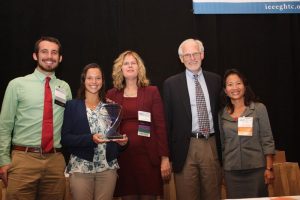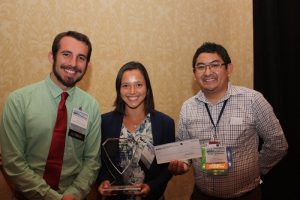The 2016 IEEE R6 Humanitarian Engineering Project Award was presented at GHTC. There were seven teams who had submitted proposals/applications. There were four judges for the award: Jay Pearlman, Dan McClure, Liza Loop, and Kip Sikes. The prize winner was:
Project: Simple Seat, Better Lives
Team:
Mei-Li He
Harrison Schmachtenberger
Caleb Avery
Affiliation: University of San Diego
Summary:
This project includes the planning, designing, and present implementation of a humanitarian engineering project named Simple Seat, Better Lives. According to the International Classification of Functioning, Disability and Health, about 19% of Uganda’s population, which is equivalent to almost 6 million people, report having a disability. The objective is to design portable, low-cost assistive devices that solve physical and socially stigmatic problems for handicapped individuals using a pit latrine, specifically in Lira, Uganda. Additionally, the devices will be constructed in Uganda, by Ugandans. The project began in 2015, with activities being primarily designing and constructing prototypes. In January 2016, three prototypes were taken to Uganda to receive feedback and design revisions from the actual future users of the devices, handicapped Ugandans. Currently, the project is finalizing multiple designs for implementation and realization. The economic plan includes a livelihood support stipend to train Ugandans at a vocational school so that they can acquire the skills necessary to produce these devices. Landmine survivors can subsequently construct and sell the devices to attain financial independence. This project will create a solution that is twofold. The latrine aid device solves the physical limitations of handicapped individuals face when using a pit latrine, while also creating a job market for the production of these devices in Uganda and combating the negative social stigma surrounding the disabled. The project’s design constraints include economic, engineering, and social limitations.
- Award Ceremony
- Prize Presentation






